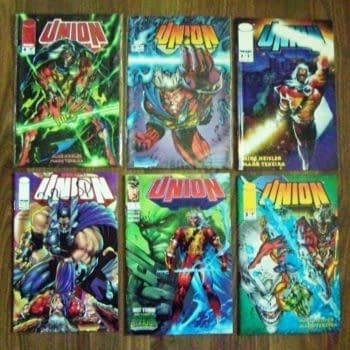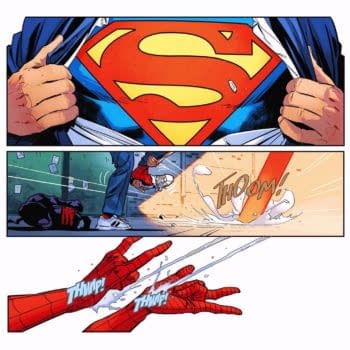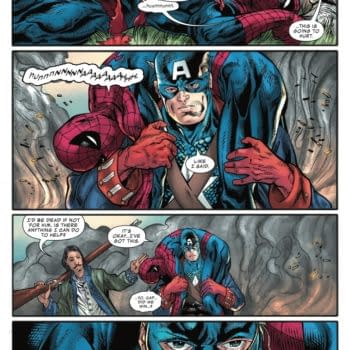Posted in: Comics | Tagged: archie, ken penders, sonic
Archie Desperate To Settle, But Can't Without Sega – The Latest In The Ken Penders Sonic Comics Case

On last Thursday, May 2, 2013, beginning at 10:03AM in Judge Berman's court room in New York's Southern District Court, we learnt that Archie Comics is so heavily invested in their relationship with Sega that they would have to pay for Sega's defense in the case. And that, despite claiming they are desperate to settle with Ken Penders, they can't settle without Sega.
Also, the judge is hilarious. I'm picturing Larry David.
THE COURT: So this looks like a fine mess, and by that I mean that this is a matter that I thought had settled or it was on the verge of settling. I guess there was no settlement agreement finally reached, and so I'm happy to give you a jury trial, which is what you're asking for, in the absence of settlement. So when are you ready to go to trial?
MR. PAUL: Your Honor, I'm Joshua Paul for the Archie Comics. So let me, to address that issue, as —
THE COURT: You just have to give me a date.
MR. PAUL: I can't give you a date. I'd like to explain why.
THE COURT: Oh.
MR. PAUL: We have the — As you know, we took this case over right before the mediation, and it has become clear to us that the focus of the case, as is reflected in the proposed jury instructions and the joint pretrial order, significantly misses a very critical legal issue. And I'm only asking for the opportunity to write to you, and I'd like to explain to you what that is because we're dealing with congressionally created copyrights.
THE COURT: This thing has been so litigated, counsel, and I'm not coming in with a new lawyer at the 11th hour and going in a totally different direction.
MR. PAUL: May I at least explain, to take a moment of your time, or if not now, will you give me an opportunity to write —
THE COURT: No, there's no need to have writing. You've had months. You, yourself, how long have you been in this case?
MR. PAUL: We've been in the case for a while. We focused on settlement. Our prior counsel exercised a retaining lien. We received —
THE COURT: You have been in the case six months, yourself?
MR. PAUL: That's right. We've received the prior lawyer's exerting retaining. So if you'll allow me, what's been focused on is the rule in copyright law which governs who owns the copyrighting as between a hiring party and —
THE COURT: If you have any familiarity with the case, you know that I know all of what you're saying.
MR. PAUL: So what's been missed, your Honor, is this. The question is, this is a derivative work. The underlying rights here don't come from Archie. They come from a contract between Sega of America, which owns the copyrights, which then granted to Archie the right to use the copyright for a particular purpose. Archie, in turn, hired Mr. Penders. The cases have
said that in this circumstance, the ownership of the derivative work is governed by the intention of the licensor and the licensee in the grant, and it's that I'd like to be able to write, at least explain that authority.
THE COURT: So are you saying prior counsel blew it?
MR. PAUL: Absolutely, your Honor. So I will say that this — the issue will need to be addressed in one forum or another, and we're hoping — we're hoping that you'll allow us an opportunity to explain the issue and to explain our proposal, our proposal for dealing with it in a way that will not further inconvenience and drain resources, but will still allow this Court to apply the correct law. I can't be as —
THE COURT: Well, give it to the jury. That's the way we're going to deal with it. We're not going to have more motion practice. My God, this thing has been litigated up, down. If it's a valid issue, you and counsel will discuss it, meet and confer. If you need to revise the joint pretrial order and the jury instructions, you'll do that, and the jury will decide it. So I get back to my original question. When would you be ready for a trial?
MR. PAUL: I did not come today prepared to answer that question, but I will —
THE COURT: That's really surprising to me because what else would we be talking about today?
MR. PAUL: I thought we were dealing with a premotion — this was a premotion conference that was brought on by a premotion application by Mr. Penders' lawyers, who are asking for an injunction.
THE COURT: So you didn't think you could talk about settlement or trial or motions you came prepared to —
MR. PAUL: Judge, please. We really don't want — we — I just want — we'll answer your questions.
THE COURT: Okay. So when are you ready for trial?
MR. PAUL: I'll have to — I have a — I think we can be ready for trial in 60 days.
THE COURT: What about you?
MR. DAMAN: Your Honor, I also had not checked the calendar for trial dates with my client on the assumption that we were here to talk about the injunction.
THE COURT: Everybody has been asleep in this case or not.
MR. DAMAN: Well, we actually — I know your Honor mentioned that there was no settlement agreement. We believed that there was actually a settlement agreement. So we thought that we were either dealing with the schedule to that and/or with the injunction to keep the status quo.
THE COURT: And you feel there is no settlement; is that right?
MR. PAUL: Absolutely.
THE COURT: And what is the — If he thinks there is and you think there isn't, that's so peculiar. Why would that be?
MR. PAUL: You're asking for why we believe there's no settlement?
THE COURT: Yes.
MR. PAUL: Sure. Because the half of page of points that were reached and signed at the mediation session —
THE COURT: With you?
MR. PAUL: Yes. We came in for that, yes. We came in and then that next week is when the mediation occurred.
THE COURT: Right.
MR. PAUL: It provided for — that, as it's first item, that Mr. Penders asserted ownership of certain rights, and that indicated that he intended to exploit those rights. We said, and this is the term sheet, that the Archie company did not agree with that assertion, but that Archie would agree that it would not pursue a claim against Penders for exploiting those rights, provided that those claimed rights would not have a look or feel as though they were part of a sonic universe. And then also said the metes and bounds of the claimed rights, which is a term of art, must, must be described in Schedule A. And so after we had the negotiation — excuse me, may I just take a brief drink; thank you — we saw you, I believe it was January 7th, and we had a very short conference. I recall explaining, I think there's a transcript that says, that the devil was in the details. We needed to work out this schedule. And we then exchanged many drafts and e-mail correspondence, which I attached to a letter that is part of the record, trying to come up with the claimed — you know, this metes and bounds of the claimed rights. The reason that was material — so it never occurred. And the reason that's material —
THE COURT: Yes, I get all that. Do you want to settle?
MR. PAUL: Desperately.
THE COURT: Does your client want to settle?
MR. PAUL: Desperately, your Honor.
THE COURT: Do you want to settle?
MR. DAMAN: Yes, your Honor. And we take issue with their —
THE COURT: Yes, of course you do. Otherwise, we'd have a settlement.
MR. DAMAN: I don't take issue with the facts as he's reciting them. I take issue with their willingness to engage in a discussion over that possible schedule.
THE COURT: Well, I'm just trying to figure out. He says he desperately wants to settle.
MR. PAUL: I can explain to you —
THE COURT: No. You've explained plenty. Do you desperately want to settle also?
MR. DAMAN: Yes, your Honor, and, in fact, we'd love to adhere to the terms of the settlement from November.
THE COURT: Okay. Here's what is escaping me. You have two, obviously, qualified, experienced, professional attorneys, both of whom desperately want to settle. I never have — I've probably done thousands of settlements. I never had — so most of them people don't — somebody doesn't desperately want to settle.
MR. PAUL: I can explain why, what's missing.
THE COURT: No, no. I know you have an explanation for everything, and I appreciate that. But when we do have two lawyers that desperately want to settle, I think I have a one hundred percent batting average of having settled cases. So either somebody really doesn't desperately want to settle — I mean, that's always a possibility — or, there are lots of ors —
MR. PAUL: Sure.
THE COURT: — personalities or you know overreaching or just can't see eye to eye, all of these possibilities. But if you have really two lawyers and two parties who desperately want to settle, no problem. Usually ten out of ten settle. So that's what is alluding me, really, today. Not this new theory —
MR. PAUL: Sure.
THE COURT: — and not what happened to the term sheet and not the metes and bounds, et cetera, none of that is alluding me. What is alluding me is why —
MR. PAUL: May I offer the reason because —
THE COURT: If you just let me finish.
MR. PAUL: All right.
THE COURT: You know, if we have a jury trial, you know, you've got to —
MR. PAUL: Yes, sir, I understand.
THE COURT: — you've got to let everybody speak.
MR. PAUL: Yes. Yes, I understand.
THE COURT: So that's the part that's really piqued my curiosity, is why there can't or isn't a settlement where people desperately want to settle.
MR. PAUL: Thank you. And I apologize for interrupting.
THE COURT: It's all right.
MR. PAUL: The reason is, that there's a third party who's very important to the settlement but is not in court, and that is Archie's licensor, Sega. Mr. Penders has sued Sega. That action has been stayed pending the resolution of this case, and we have an obligation, we — I will say a practical obligation because the last thing we want there to be is a dispute with our good licensor. But our licensor expects Archie to take care of this problem, as any licensor would. And so while we have, I think, as between Mr. Penders and Archie, we really could — if those were the only parties, we could do a deal. The problem is that we are paying or are responsible for that part of the overall equation, and the value that Mr. Penders has assigned to that second part of the equation does not take into account this legal issue that I brought to you just now.
THE COURT: Yes, I get it. I get it.
MR. PAUL: Okay? So that's the problem.
THE COURT: So you're saying the missing link is the third party?
MR. PAUL: The missing link is the premise, the legal premise that Mr. Penders brings to his valuation and, in fact, the fact of whether he has a claim or not against Sega. And while it would be very inefficient, we could deal with one thing — we could — I understand, if we could resolve issues between these two parties, but if you're asking — your question was what's the impediment to settlement.
THE COURT: You can't —
MR. PAUL: We're going to end up having to pay for Sega's defense.
THE COURT: It's pretty obvious, though, isn't it? Why don't you just bring in Sega to your settlement conversations? I mean, if there's some other missing aspect —
MR. PAUL: Right. We have — Until we can interject into the discussion the rule, what the courts have said about the ownership of the derivative of the rights, then there's no point.
THE COURT: You're talking — forgive me.
MR. PAUL: Please, please.
THE COURT: You're talking about angels on a pin. So practical lawyers —
MR. PAUL: Practical lawyers, they want a lot of money.
THE COURT: Can I finish?
MR. PAUL: Of course.
THE COURT: So practical lawyers say if there's a missing person, so to speak, who's already been sued and that's indispensable to the resolution of your, meaning the two of you, controversy, so bring in the third person and three lawyers sit down and settle the case. Right? You have a claim against the third party, separate claim, right?
MR. DAMAN: Yes, your Honor. We would agree with everything you've just said. We've been asked not to contact Sega, and we've adhered to their wishes.
THE COURT: That makes no sense.
MR. PAUL: Judge, the case won't go away though, because Sega won't offer a dime.
THE COURT: I don't know who asked you not to. I don't think I did.
MR. DAMAN: We were asked by ACP, the other party in this case —
THE COURT: Right.
MR. DAMAN: — not to.
THE COURT: So but that makes no sense. Forgive me. If he's saying that they're the missing link and, you know, you're two smart business lawyers, so get the missing link. Bring the missing link in and solve all the issues.
MR. DAMAN: As an alternative, your Honor, and what happened in November was ACP and Mr. Penders settled their disputes as between themselves.
THE COURT: Right.
MR. DAMAN: What happened after, in the guise of issuance in the schedule, is they brought up issues on releases for Sega that were not — that were specifically excluded in November. So we agree, if you're going to bring in Sega, that brings in a whole set of different circumstances in evaluations and that's where we've been bogged down.
THE COURT: I would think so.
MR. PAUL: The reason Sega is essential, as a practical matter, because Archie needs to continue living with them.
THE COURT: You both agree he is, so why don't you —
MR. PAUL: I understand.
THE COURT: — bring him in?
MR. PAUL: But Sega is not — What needs to be resolved or addressed are the more fundamental question of whether this plaintiff has any rights whatsoever.
THE COURT: What we're talking about is settlement. That's what we're talking about. So I don't know if you want to write a law review article on this subject —
MR. PAUL: No, I don't.
THE COURT: — or you want to give a lecture or whatever. You know, you could do that on the outside. But we're talking now about the real world and settling a case. And if Sega's got, you know, a horse in the race, as it were, that's sort of indispensable to you settling, then why don't you bring in Sega? Who represents Sega?
MR. PAUL: They're represented by counsel on the West Coast.
THE COURT: It would be the thing to do, no?
MR. DAMAN: Again, your Honor, we are certainly amenable to that. We've asked for it several times.
THE COURT: Are you amenable to that.
MR. PAUL: In light of the discussion, I'm certainly amenable to it.
THE COURT: So then the question is the how, you know, the mechanics. You can either do it on yourselves. I'm sure I could find a magistrate judge that would help, if you'd think that would be useful, or I could be helpful, if you think that would be useful, or parties sometimes go out to JAMS or wherever and find a — and you've had a mediator.
MR. PAUL: We have, and he's indicated he's willing to stay with us.
THE COURT: So maybe that mediator, maybe that's the obvious thing to do just to get the Sega lawyer, or I don't know if you go there with principles. Seems to me it would be the obvious thing to do. It's never been tried, I take it.
MR. PAUL: No.
MR. DAMAN: No, your Honor. We've been explicitly told not to do that. It has not been tried.
THE COURT: All right. So don't you think that would be a more fruitful way to go?
MR. PAUL: I do. I'm hoping that when we do that, that we'll have an opportunity to reframe the expectations of Mr. Penders in terms of what his rights are worth.
THE COURT: Well, you know what, you usually go into — the most successful way to go into arbitration or mediation or settlement is without setting any parameters about whether — what Mr. Penders is or isn't willing to do. It's just to go, in good faith, and present to the mediator what you feel are your strongest points vis-a-vis each other and Sega and vice versa. And I take it the mediator is a skillful person?
MR. PAUL: Yes, I think he is.
THE COURT: Do you feel that way, too?
MR. DAMAN: Yes, he was very —
THE COURT: He's helpful so far. He helped you get to a term sheet, right? And if he's willing to help some more, I would say you should schedule a mediation with the three of you before the same mediator.
MR. DAMAN: And, your Honor, I would also say that Mr. Paul brought up this new theory to me just outside. We're willing to read the law on it.
THE COURT: Absolutely, everybody would be. Me too. Me too, although I'd rather you read it first —
MR. PAUL: Of course.
THE COURT: — and see where it takes you, but if and when I have to, I'm happy to read it as well. So how long would it — Let's change the dynamic then. How long would it take you to put that mediation together? Of course, it depends on the mediator, his schedule and your schedules. And who is the attorney from California? Is it a big firm or a small firm?
MR. PAUL: It's a big firm. It's Fenwick and West, and I think their Palo Alto office.
THE COURT: So I leave that — What do you think is a reasonable time? What I'd like to do is to set another status conference here, which would be post any such mediation. So you two, if you want to go off the record and talk among, between yourselves as to what is likely, or if you even want to make a phone call or two, to the mediator and/or Sega's
counsel, and then we'll reconvene here in an hour or so.
MR. PAUL: I think that probably would be best since we're dealing with —
THE COURT: West Coast and —
MR. PAUL: Yes, West Coast. Is that fair? I'm here.
MR. DAMAN: I think the scheduling is something that is very worthwhile. I don't know that I have confidence that in an hour we'll have gotten the relevant people on the phone to make a date. So I would say we should probably set a reasonable time, as we've been doing, either a month or six weeks to come back, by which time it should have happened.
THE COURT: Okay. I'm game for
MR. PAUL: I have a — my suggestion would be give us 24 hours and we'll tell you, you know — we can then — we'll know — or 48 hours, and we'll know when the mediation will be,
and then we can schedule the next conference for whatever time you think is reasonable after that.
THE COURT: All right. Let's say Monday. Do you want to come back here or call me on the phone?
MR. PAUL: The phone is fine. Whatever you like.
THE COURT: Phone?
MR. DAMAN: We prefer the phone.
THE COURT: Okay. We'll have a phone conference on Monday at 10:00 a.m. So that is, what, May 6th at 10:00 a.m. Okay. Anything else you want to add for today?
MR. PAUL: No. Just, so we're not going to deal with a date for a trial? We'll just deal with that if we need to?
THE COURT: I wouldn't think it makes any sense. Maybe we can obviate the need for all that.
MR. DAMAN: I agree. It wouldn't make sense to deal with the trial. I guess because of Mr. Penders' experience, while this has been going on, you know, the motion for — will we be allowed to file a motion for the injunction against publication of the works, which is a letter, your Honor. I'm just asking to be allowed to file a motion.
THE COURT: Okay. Why don't we talk about that on Monday on the phone conference, and if need be, we can set a schedule for such a motion. Okay?
16 MR. PAUL: Okay.
MR. DAMAN: Fine. Thank you, your Honor.
THE COURT: If we don't need to, if you're more successful between now and Monday, you may put that aside, too. But you'll let me know. Okay?
MR. DAMAN: Thank you very much, your Honor.
MR. PAUL: Thank you.
THE COURT: Great to see you both.
MR. DAMAN: Thank you, your Honor.
THE COURT: Thanks, so much.















